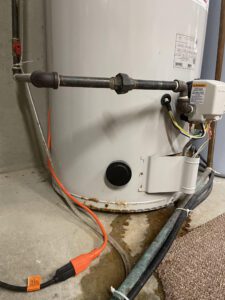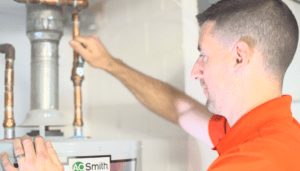 Seeing water on your basement floor is never a pleasant surprise, but it doesn’t necessarily always mean a big repair bill is coming your way. If the water is near your water heater it’s easy to assume that it’s your water heater that is leaking. However, it is common for furnaces and water softeners to leak as well. It is important to try to discern where the leak is coming from before you call for plumbing service. Dry the area and put down towels where you think the leak may be coming from. Wait a few hours and check to see which towels are wet and this should help you determine if the leak is coming directly from the water heater.
Seeing water on your basement floor is never a pleasant surprise, but it doesn’t necessarily always mean a big repair bill is coming your way. If the water is near your water heater it’s easy to assume that it’s your water heater that is leaking. However, it is common for furnaces and water softeners to leak as well. It is important to try to discern where the leak is coming from before you call for plumbing service. Dry the area and put down towels where you think the leak may be coming from. Wait a few hours and check to see which towels are wet and this should help you determine if the leak is coming directly from the water heater.
READ MORE: Furnace Leaks
Think about a Wet Switch
Rather than being reactive once a leak has sprung and trying to determine the source, there are other more proactive options available to detect leaks. You can install a wet switch on the water source of any piece of equipment or appliance. If the switch detects water, it will automatically shut off the water supply to that appliance so that any further damage is prevented. Some models even feature an alarm that will notify you immediately when the leak is detected.
- Here is an option from Best Buy that also integrates with SimpliSafe products.
- Here is an option available on Amazon from Moen that features smartphone alerts.
If you do determine the water heater is the source of the puddles of water on the floor, the next question is, why is it leaking? These are just some of the most common causes of a water heater leak.
Causes of Hot Water Heater Leaking
- Temperature and pressure relief valve dysfunction (T&P Valve) – the pressure relief valve may open if the pressure inside the tank gets too high. Check if the valve is working properly or needs replacement.
- Loose gaskets
- Tank corrosion due to old age and/or hard water damage – over time, the tank can corrode and develop leaks. This usually means the water heater needs to be replaced.
- Loose fittings – check the inlet and outlet pipes for loose connections. Tightening these connections might solve the problem.
- Leaking joints
- Sediment build-up inside a tank or tankless water heater – sediment can accumulate at the bottom of the tank, causing overheating and deterioration of the tank.
- Expansion tank could be full causing high water pressure.
What to do
First, you need to turn off the water. The hot water heater is going to constantly refill itself from the leak, so it is important to complete this step quickly to prevent water damage and a massive cleanup. There are two pipes on the top of tank water heaters. When you touch them, one will be cold and one will be warm. The cold pipe is the water supply line. This is the one you should turn off. The cool feeling pipe should have a valve you can pull or twist to shut off the water – this is called either a ball valve or a gate valve.
If there is no shutoff valve at the pipe, you’ll have to use your home’s main shut-off valve which will cause your entire home to be unable to supply water until it is turned back on.
If your water heater is electric, we’d also recommend turning the power off to the water heater. You can do this by switching off the breaker in your electrical panel.
If you are able, it would also make sense to drain the water heater. You can do this by attaching a garden hose to the drain valve at the bottom of the tank and directing it to a safe drainage area. Open the valve to start draining.
 Water Heater Leaking from Top vs Leaking from Bottom
Water Heater Leaking from Top vs Leaking from Bottom
Leaking from the top typically means a higher likelihood the water heater can be repaired. This is because a leak at the top typically indicates a part or piece of the water heater is defective rather than the entire unit itself.
Leaking from the bottom often indicates a higher likelihood of needing water heater replacement. This is because a leak at the bottom is often coming from the unit itself or multiple issues compounded together. This is not always true, but just what we often see.
Maintenance Helps Prevent Leaks
Just like most home items, maintenance is recommended annually for your water heater to remove sediment buildup and check that everything is in good operating condition. Flushing the tank annually, especially if you have hard water, will help extend the life of the system and prevent tank corrosion. Annual water heater maintenance plus a whole-home plumbing inspection is included in our Total Care Club Super Savings Plans.
Typical Lifespan of a Water Heater
A typical tank water heater will last approximately 10 years. If you have a tankless water heater you can expect about 20 years of use before needing to replace.
Consider going Tankless
A tankless water heater is significantly more efficient than a traditional tank water heater because it heats water on demand, eliminating the standby heat loss associated with constantly maintaining a reservoir of hot water. This on-demand heating method results in substantial energy savings, particularly in households with lower hot water usage. Additionally, tankless water heaters boast a longer lifespan, often lasting over 20 years compared to the 10-15 years typical of tank heaters. This longevity is further supported by their design, which avoids the sediment buildup that plagues tank systems and requires less frequent maintenance. The absence of a storage tank reduces the need for regular flushing and makes tankless units a more durable and low-maintenance option for homeowners.
Extend Water Heater Life & Warranty with Premium Water Heater Anode Rods
An anode rod is a piece inside all tank water heaters that helps prevent tank corrosion and rust. It’s a steel wire with either aluminum or magnesium surrounding it. It runs down the center of a tank water heater and attracts all the sediment and other damaging elements from harming the water heater itself. Most standard anode rods will need to be replaced 1-2 times in order to keep the unit working properly without corrosion. There is the option to upgrade your anode rod with your water heater installation. This anode rod may cost more upfront but will extend the life of your water heater. With Quality Comfort adding this premium anode rod will also extend the warranty with our State brand water heaters from 6 years to 10 years.
Water Heater Repair Near Cincinnati
If your water heater, furnace or water softener is leaking and you need expert plumbing service – contact Quality Comfort today at 513-620-4822 or you can book service online 24/7.

